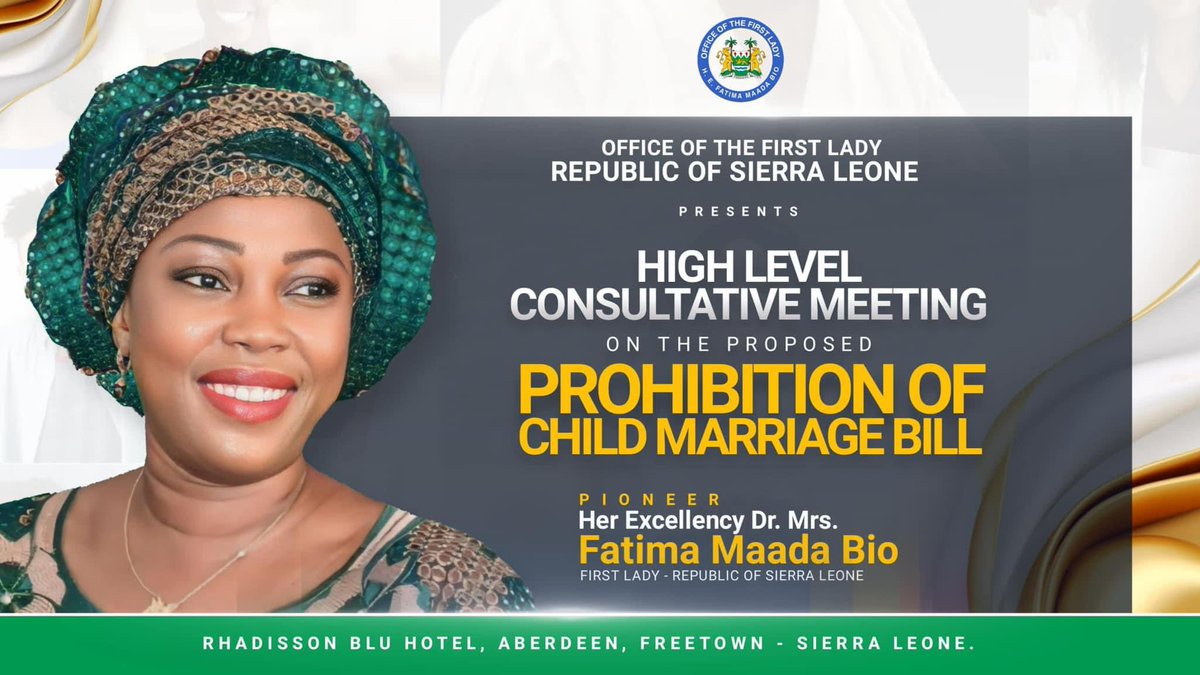On Friday, Sierra Leone’s First Lady tweeted, “Today I convened a critical High-Level Consultative Meeting, held at the Radisson Blu Hotel to focus on the proposed Prohibition of Early Child Marriage Bill, a vital step to protect children’s rights and well-being in the country. I passionately emphasized the urgency and importance of enacting legislation to prohibit early child marriage. I highlighted the devastating impact of this harmful practice on young girls, their families, and society as a whole. I articulated a compelling arguments in favour of stringent legal measures to safeguard the well-being and the prospects of Sierra Leone’s children.”
Her call for a prohibition of child marriage in Sierra Leone was puzzling since the issue has already been addressed by existing legislation. In 2007, Sierra Leone enacted the Child Rights Act, which unequivocally prohibits child marriage, setting the minimum age for marriage at 18 years and outlawing forced betrothals and dowry transactions. Section 34 of the Act states that
“(1) The minimum age of marriage of whatever kind shall be eighteen years.
(2) No person shall force a child –
- (a) to be betrothed;
- (b) to be the subject of a dowry transaction; or
- (c) to be married.
(3) Notwithstanding any law to the contrary, no certificate, licence or registration shall be granted in respect of any marriage unless the registrar or other responsible officer is satisfied that the parties to the marriage are of the age of maturity.”
The question remains unanswered: What exactly is the First Lady attempting to forbid? Is she seeking to lower the legal age from 18? If so, why? Is there a plan to outlaw parental approval for marriages involving individuals under 18? If this is the intent, then the title of her project should not read the prohibition of child marriage bill but rather the elimination of consent for child marriage bill. These are two different things.
Whatever the case, we find ourselves at a loss for words regarding the current framing of the project, and we believe that more information regarding her precise goals should be made available to the public.
True, despite the enactment of section 34 of the Child Rights Act, child marriage continues to plague communities across the country, signalling a glaring gap between legislation and implementation.
The First Lady’s push for a new law raises pertinent questions about the necessity and efficacy of legislative measures in combating child marriage. Rather than duplicating existing laws, the focus must shift towards implementing and enforcing the provisions of the Child Rights Act.
The persistence of child marriage underscores the need for a multifaceted approach that addresses the root causes of this harmful practice. While legal frameworks are essential, they must be complemented by targeted interventions aimed at changing societal norms and attitudes towards early marriage.
One critical aspect that requires immediate attention is the enforcement of existing laws. Despite the clear prohibition of child marriage, many communities, particularly in rural areas, continue to flout these laws due to entrenched cultural beliefs and practices. Strengthening enforcement mechanisms and holding perpetrators accountable are imperative steps in curbing this pervasive issue.
Moreover, emphasis should be placed on comprehensive education and awareness campaigns that challenge the misconceptions surrounding child marriage and highlight its detrimental impact on girls’ health, education, and overall well-being. These campaigns should target not only young girls but also their families, community leaders, and religious authorities, fostering a collective understanding of the need to end this harmful practice.
Empowering girls through education and economic opportunities is also crucial in providing them with alternatives to early marriage. By investing in girls’ education and vocational training programs, we can equip them with the skills and knowledge to assert their rights and pursue their aspirations.
Community engagement and dialogue are indispensable in addressing deeply ingrained cultural practices. The First Lady’s advocacy efforts should prioritize engagement with local communities, religious leaders, and traditional authorities to facilitate open discussions and promote cultural shifts towards ending child marriage.
While the First Lady’s commitment to ending child marriage is commendable, her focus on enacting redundant legislation overlooks the more pressing need for effective implementation of existing laws. By redirecting efforts towards enforcement, education, empowerment, and community engagement, we can work towards a future where every child in Sierra Leone is protected from the scourge of early marriage.







